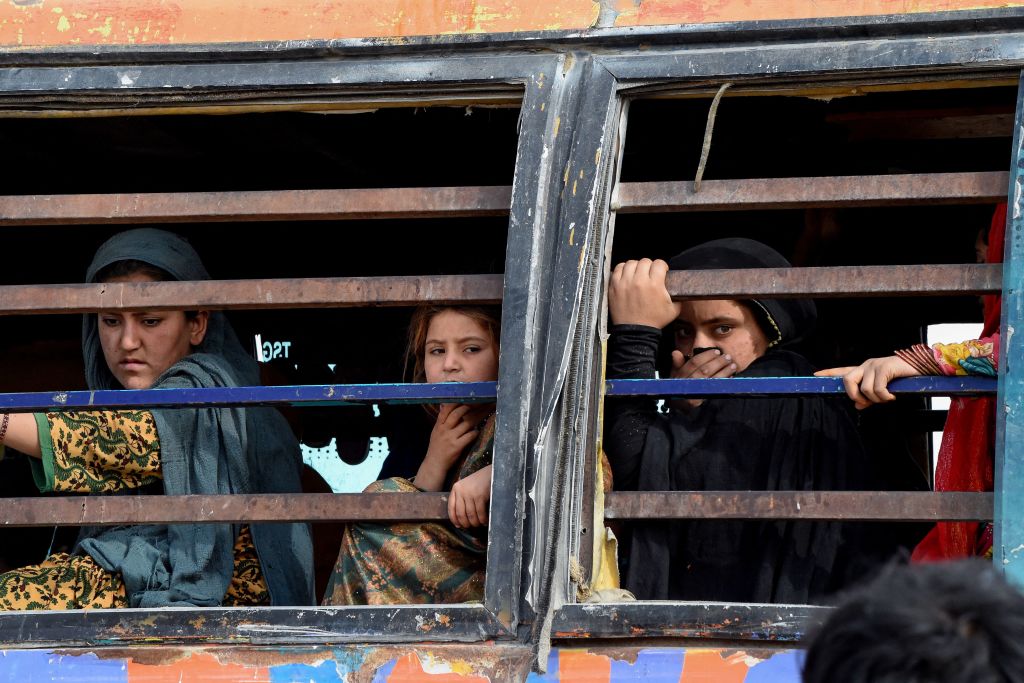When the Taliban took over Afghanistan in August 2021, they stripped women of their basic rights to work and education. Many families, especially those headed by women, felt they had no choice but to leave. Most of them ended up in neighboring Pakistan and Iran, which for decades have hosted large numbers of Afghan refugees.
That all changed last year when the Pakistani government announced it would forcefully deport undocumented immigrants who hadn’t voluntarily left by November. This mostly affected the 1.3 million Afghans living in Pakistan. Since mid-September last year, more than 375,000 Afghans have left, 20,000 of them forcibly. Pakistani authorities have carried out mass detentions, seized property and livestock and destroyed identity documents, according to Human Rights Watch.
At Zan Times, a newsroom led by Afghan women and a regular Fuller Project partner, we’ve been reporting on what it means for women forced to return to a country where they face serious risk. Below is the story of Z Ahamdi, who was arrested in Pakistan with her family (she isn’t using her full name for security reasons). Her words have been translated and edited for clarity.
The Pakistani police stormed my house at 10 a.m. on Thursday, November 2 while we were eating breakfast. My children had just woken up. They quickly and angrily ransacked all the bedrooms, the kitchen and the bathroom. They asked us for documents. When we showed them our U.N. card, [which shows that my family and I came to Pakistan as refugees and our case is being processed], they threw it away and said that our visa had expired, and we should all be imprisoned. They forced us out of our home, including my husband, my four children and my two guests, and locked the door. They took us to prison.
Before coming to Pakistan, I practiced law independently in Herat for six years. Five other young women worked with me in my office. Most of the cases we worked on had to do with domestic violence, family disputes and divorce. Many times, we were threatened by the parties to our [practice’s] lawsuits. When the Taliban came to power, the people opposed to our work became bolder and could target us more easily. At the beginning of the Taliban rule, I approached the government offices several times to get a work permit, but they did not even allow me to go inside.
In October 2021, the Taliban imprisoned my brother for 10 days. They asked him to stop me from practicing law. My brother left Afghanistan very soon after his release. In May 2022, I was able to get a one-month medical visa and went to Pakistan. [While there], I applied for a visa extension, which got rejected after eight months. That’s why I have been living without a visa since last year. I have only one document from the UNHCR office [the UN Refugee Agency].
The prison was very cold. There were about 40 people, including women, children and men. Everyone was in a miserable situation. There were two beds, on which old women were sitting, and the rest were on the cold and damp floor. No one was wearing warm clothes. Everyone was shivering. Small children were just crying.
My one-year-old son suffered a seizure. When he fainted, I made noise. They only allowed me and my son to go to the hospital. They kept the rest of my family, including my two daughters and my 9-year-old son. I tried my best to free them from prison. But I heard that they were transferred to the refugee camp the next morning. I was so scared.
I contacted several places, including UNHCR and the World Association of Defense Lawyers. Their pressure made the Pakistan Bar Association help free my family. They were released after two days and one night. We came to Pakistan hoping to start a comfortable life. My children should study but now no school accepts them because they are refugees. We are all destitute, depressed and have no hope.
Now, if we want to renew the visa again, we have to pay a $6,000 fine. We cannot afford to pay such a big amount. The Pakistani government announced that it would give refugees until February to voluntarily pay the fines and leave Pakistan. Anyone who does not voluntarily leave Pakistan after February 2024 will be fined $100 every month.
We haven’t been able to leave the house for two months. We buy the food we need with the help of our Pakistani neighbor. Every moment I fear that we will be caught and sent back to Afghanistan. If we are deported, the Taliban and those who were parties to our lawsuits can easily harm or kill us.


 Zahra Nader
Zahra Nader
